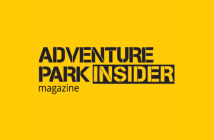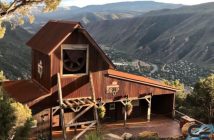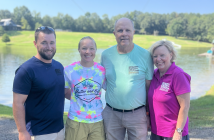For nearly 30 years, Jim Wall and his business partner, wife Catherine, have built everything from ropes courses and zip lines to canopy tours and tactical training courses. Throughout the years—and the formation of several businesses—the Walls have managed to evolve with the times and the trends while focusing on their core competencies, notably building for educational institutions and the military. Their company, North Carolina-based Challenge Design Innovations, Inc. (CDI), founded in 2010, is the latest in a line of successful enterprises, which include CDI’s gear-supply arm, High Country Hardware.
Jim got his start in the industry in 1980 when he built his first course at San-Lee Park, N.C., where he also served as a park ranger. From there, he established his first course building business, Outdoor Institute, and, under that umbrella, created courses for a variety of educational institutions including the University of Michigan, the University of Iowa, and Georgia College & State University, where he started an outdoor undergraduate degree program. Around that time, he also started dating Catherine, who has a background in military logistics; together with Jim’s son, Corey, the pair launched Walls Outdoor Associates. In 2000, they co-founded Cornerstone Design, the business that would eventually become CDI in 2010.

The Walls have been leaders in the industry as they’ve grown their business. In 2016, Jim received the Association for Challenge Course Technology (ACCT) Critical Link award for his contributions to the organization. He served on the ACCT board of directors for six years and has worked on various task forces. Over the last decade, CDI has built more than 150 aerial adventure and team challenge courses in 36 states, and it serves the inspection, training, and maintenance needs of more than 300 university, camp, military, therapeutic, and recreation program clients.
Jim always knew he wanted to leave CDI as a legacy for his son, and in 2018, he and Catherine retired and handed over the reins to Corey. API sat down with all three to talk about CDI and the nature of family business.
API: This has been a family business involving all three of you from early on.
CATHERINE: That’s true. We started our first business within a year of being married, and we’ve been business partners for almost 30 years. It’s a lot of pleasure, but there are also a lot of challenges working on different levels with your business and family members.
JIM: Our daughter, Jamie, also used to work with us building courses. She initially stayed down in Georgia, but seven years ago she moved up here [to North Carolina]. Now, she’s Corey’s office and logistics manager.
API: Jim, you were a park ranger, so where did your course building expertise come from?
JIM: Being a park ranger in the ‘80s, it was the Wild, Wild West for sure. We built the first course by going to the Federal Surplus Warehouse in Asheville, N.C., and bought all the supplies for $35—rope, cable, everything. We went and visited two courses up in the mountains and made sketches and climbed around the course, then we went back and built one. I grew up on a farm in eastern North Carolina kind of being a project guy, figuring out things. So, over the years, we just built our expertise hands-on by actually doing it, talking to other people, going to workshops, going to ACCT, reading standards, that kind of thing.
API: Catherine, your role in the company includes bookkeeping, but a lot more, too.
CATHERINE: I was a counselor at the University of North Carolina–Wilmington when Jim built the course there, so that helped in transitioning into the training area [of the business]. I was a logistics person in the military for a number of years, so I bring that piece as well. We have grown this business by everybody working hard and people’s expertise coming together.

Three-tier challenge course for the Virginia Tech Venture Out program.
API: What brought the two of you together?
JIM: When I built the course for UNC Wilmington, the woman that was running the center said, “My roommate is coming to take the training, too. She works in the counseling center.” I had been divorced almost nine years at that point, raising Jamie and Corey, and us raising each other pretty much. I met Catherine, and six months later, Corey asked us to marry (laughs).
CATHERINE: All of the decisions are family decisions.
API: Corey, how old were you when you got into the family business?
COREY: Well, I could hold a drill at 12. That was in 1990. So, once I could hold the drill, I was released to build my own course (laughs). The University of Michigan was the first course I built with [Jim]. When I graduated grad school in 2001, that’s when I started full time. Those first couple of years, I think we had 30 clients. Now, we have 347. It’s a very different industry. At one time we could work hard and play hard, and 50 percent of our staff would take off three months a year. Nowadays, we don’t have down time anymore.
API: There’s a lot more work now. Is there more competition?
COREY: There’s actually less, because there aren’t enough people to handle the volume. Every time you build a course, you’re expected to maintain it, so it creates another job. Then, when somebody wants you to build a new course, you wonder how you can do maintenance and trainings and inspections for current clients. We put in about 100 bids this past year, and out of those, we maybe bid against somebody else three or four times.

Three-tier custom course at the University of South Florida with zip lines and adaptive-access system.
API: How many jobs are you taking on per year at this point?
COREY: With inspections and training and repairs and new construction, probably about 30 new jobs a year.
API: It’s always hard to manage growth in a company, especially a family-owned company. How do you manage it?
COREY: We manage growth by keeping a check on the employees and asking them what success is to them. I don’t want to be the one that’s holding all the pulse of the business. Without our employees, we’re nothing. We have had to make some hard decisions as owners, but we’ve always had a great support staff.
API: So, you’ve gone to your employees and asked how many jobs they think you should take on this year?
COREY: I literally sit around the table and ask every single one of them how many days they want to work on the road this year.
API: What are your internal criteria for the kinds of jobs that you take on? What work appeals to you?
COREY: CDI has learned over the years that there are certain types of projects that we’re better at. For example, I wouldn’t want to build a large indoor ropes course at a mall.
API: What do you do really well?
COREY: We do well at colleges and universities, because we know the setting. They have volume, but it’s also very seasonal, and we understand that they may take 200 people through the course, but they’re not going to take them through in two hours, or over a 10-hour day where groups of 15 show up. They’re going to have the freshman come out in groups of five throughout the week at freshman orientation.

CDI-built Mainland Adventure Park, N.J., has 55 elements; Jim at Sky Valley Zip Tours, N.C., where he helped with training and management for several years; the Tough One element at Fort Hood, Texas, is part of one of the first major projects under the Challenge Design Innovations name.
API: CDI also works with the military a lot. How did that come about?
JIM: When 9/11 came along, and with Catherine’s military background, I knew that day, sitting there watching the towers that we were going to urban war. We’re going to Iraq, and we’re going to be helicoptering in folks, and we hadn’t done urban warfare since Somalia. And the military is really good at keeping up and doing training. So, I knew right then that they needed air assault rappel towers and obstacle courses. And all of a sudden, we were building at the Naval Academy and Fort Knox.

Training sessions at the Fort Knox (Ky.) Dual Lane Tarzan Course.
COREY: What the military taught us is how to do volume, how to handle large projects. And if there is an accident, the military—wow, you talk about risk assessment—every single accident, they make sure to break it down.
JIM: From 2001 to 2011, we were doing quite a bit of military work because we were in the war, and the military needed it. But I saw the writing on the wall—getting out of Iraq and downsizing in Afghanistan. At that point, Corey and I and others in our company started looking into zip line and canopy tours, then started jumping into aerial parks.
API: Your equipment business, High Country Hardware, started around the same time.
JIM: Yes. In 2010 we started that. And about three years ago, we added Rock Edge, the glove business for aerial parks and zip line tours.
CATHERINE: The equipment was a natural evolution from having to buy all the gear for startups. You build a course and you have to get all of their individual gear, and then the next year they say, “Hey, can we get some more of those carabiners?” We decided, well, we might as well take it all on. We obviously sell a lot of equipment to our new and returning clients, but now that we have the website, we’re selling more to general-public kind of courses as well.
API: You told me that your consulting business has changed over time because the industry itself has changed, with more formalized certification and training. What other changes have you seen over the years?
JIM: The industry has evolved from a group of guys helping each other build a course here and there. We all realized early that we needed to be sharing. Luckily enough, there’s been enough business for folks not to be cutthroat, and to sit down and develop standards for the industry.
API: So, it is still a rising tide lifting all boats?
JIM: Yes, and I think it will be for a lot of years. We’re not that old of an industry. We’re still evolving and developing standards. There are people out there who want to take zip lining and turn it into a theme park, with those kinds of standards. They don’t want to think of it as a participatory sports activity. There’s a group of us in the zip line world that think hand brakes are acceptable and a managed risk, and there are people out there who think, “Oh, hell no, you need to have mechanical brakes and that’s it.”

Texas TreeVentures is a three-tier, hub-and-spoke course with an Edelrid Smart Belay system.
COREY: The question of whether we are recreation or amusement is one that a lot of companies are going to have to answer. I’m not saying there can’t be a balance, or that the customer can’t choose, but it can’t be forced from a regulatory and jurisdictional perspective.
API: Where do you see CDI going in the next few years?
COREY: I think the military is still strong for us, because it still allows risk and has a great process where they monitor contractors and have a lot of third-party review. The military will mitigate some risk, but they’ll still let you fall 32 feet. It’s a whole different world. CDI doesn’t want to get into a certain niche—we can be an expert in military, in schools and colleges, and in the commercial recreation industry, but I don’t want to be an expert at trampoline parks or get outside the ropes course, zip line, and aerial course industry.
API: Your dad said he considered CDI a legacy for you. What does that mean to you?
COREY: Where we are today is because of the people and connections that my dad made over the years just being open and friendly to the whole industry. That’s still CDI’s mission: community. If you call us, I don’t care if you’re my customer or not, I’m going to give you my opinion to help you be a better organization. That’s why my dad served on so many boards and did so much volunteer work—he always brought 10 or 15 people with him to every conference he went to, because he thought groups were stronger if everyone was educated. At the end of the day, CDI wants groups to do what’s right for their program and their jurisdiction.






